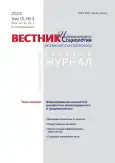Towards a scientific interpretation of the social effectiveness of education
- Authors: Osipov A.M.1
-
Affiliations:
- Herzen University
- Issue: Vol 15, No 3 (2024)
- Pages: 156-171
- Section: Problems of Education in Russia
- URL: https://journal-vniispk.ru/2221-1616/article/view/270238
- DOI: https://doi.org/10.19181/vis.2024.15.3.9
- EDN: https://elibrary.ru/LVSYFJ
- ID: 270238
Cite item
Full Text
Abstract
The article substantiates the problem of the social effectiveness of education as the main scientific and practical product and, at the same time, as the area of theoretical integration of the sociology of education. Its solution is a prerequisite for overcoming bureau-pathologies and the transition from universal and bureaucratic management to scientific management of education. The approach to the social effectiveness of education is disclosed on the basis of the concept of its institutional functions, as the ratio of socially significant results to the total costs (including intangible) of education. The interpretation of this problem involves: determining the methodological role of sociology in solving this theoretical and applied problem; taking into account the entire spectrum of institutional functions (impact on all spheres of society, delay in results in time; irreducibility to a market service or pedo-centric and "competence" schemes); interdisciplinary interaction for the conceptualisation of social costs and results.
The absence of the concept of "social effectiveness of education" in the current legislation of the Russian Federation creates a normative space for bureaupathologies in educational policy. Bureaucrats replace the public efficiency of education – a multi-component criterion of management quality – with project management that is advantageous to them. They ignore the extensive responsibility of education in society, breaking up its management into short projects, and in this the bureaucrats´ actions merge with neoliberal “modernisations” and pedo-centric “reforms”, leading education to a crisis, waste of state resources, and lagging behind in global competition.
The author comes to the conclusion that in order to solve the problem of efficiency, a methodology for analysing public costs and results of education within the framework of its institutional functions is necessary. Successful development of the concept of public efficiency will ensure the accelerated development of the sociology of education in Russia against the background of global trends of shallow topics and theoretical disintegration of this branch of science. The latter, in the author's opinion, fully meets the priorities of Russian society, education and science.
The absence of the concept of "social effectiveness of education" in the current legislation of the Russian Federation creates a normative space for bureaupathologies in educational policy. Bureaucrats replace the public efficiency of education – a multi-component criterion of management quality – with project management that is advantageous to them. They ignore the extensive responsibility of education in society, breaking up its management into short projects, and in this the bureaucrats´ actions merge with neoliberal “modernisations” and pedo-centric “reforms”, leading education to a crisis, waste of state resources, and lagging behind in global competition.
The author comes to the conclusion that in order to solve the problem of efficiency, a methodology for analysing public costs and results of education within the framework of its institutional functions is necessary. Successful development of the concept of public efficiency will ensure the accelerated development of the sociology of education in Russia against the background of global trends of shallow topics and theoretical disintegration of this branch of science. The latter, in the author's opinion, fully meets the priorities of Russian society, education and science.
About the authors
Alexander M. Osipov
Herzen University
Email: osipov.al58@gmail.com
ORCID iD: 0000-0002-9314-389X
SPIN-code: 3590-8187
Doctor of Sociological sciences, Professor, Senior Research St. Petersburg, Russia
References
- Капелюшников Р. И. Отдача от образования в России: ниже некуда? // Вопросы экономики. 2021. № 8. С. 37–68. doi: 10.32609/0042-8736-2021-8-37-68; EDN: PHQPVC.
- Линьков А. Я., Василенко Н. В. Экономика образования. М.: ИНФРА-М, 2017. 411 с. EDN: ZFZLUN.
- Матвеева Н. А. О соотношении инерционности и субъектности в системе образования // Социологические исследования. 2002. № 3. С. 83–87. EDN: WZPXYP.
- Матвеева Н. А. Социальная инерция: к определению понятия // Социологически исследования. 2004. № 4. С. 15–23. EDN: OWVWWD.
- Осипов А. М. Глобальные противоречия и цивилизационные приоритеты России // Вестник госун-та Дубна. Сер.: Науки о человеке и обществе. 2022. № 1. С. 20–25. EDN: KZHPHS.
- Осипов А. М. Приоритеты изучения образования в свете проблемы бюропатологий // Вестник Института социологии. 2023. Т. 14. № 2. С. 15–33. doi: 10.19181/vis.2023.14.2.2; EDN: UOVTMS.
- Осипов А. М. «Троянские кони» неолиберализма в образовании // Социологические исследования. 2017. № 8. С. 137–148. doi: 10.7868/S0132162517080153; EDN: ZGOXVZ.
- Осипов А. М., Иванова В. А. Институциональные функции – пороговая проблема современной социологии образования // Социологические исследования. 2016. № 1. С. 117–124. EDN: VSLWYN.
- Осипов А. М., Наран Б. Какова общественная эффективность образования в России? // Вестник РУДН. Сер.: Социология. 2023. № 4. С. 888–900. doi: 10.22363/2313-2272-2023-23-4-888-900; EDN: CFHNRS.
- Руткевич М. Н., Рубина Л. Я. Общественные потребности, система образования, молодежь. М.: Политиздат, 1988. 224 с.
- Смолин О. Н. Экономический рост и образовательная политика: технологии и идеология // Экономическое возрождение России. 2019. № 1(59). С. 29–39. EDN: YYIULB.
- Социология образования: учеб. и практ. для вузов / Под ред. А. М. Осипова. М.: ЮРАЙТ, 2023. 365 с. EDN: QKKMDH.
- Чекмарев В. В. Флим-флам (пинг-понг) для системы образования // Экономика образования. 2014. № 1. С. 7–10. EDN: SCDHZJ.
- Школа в бумажной пучине: кризис информационных потоков в образовании / Под ред. А. М. Осипова. В. Новгород: Виконт, 2020. 351 с. EDN: MSNLLC.
Supplementary files










